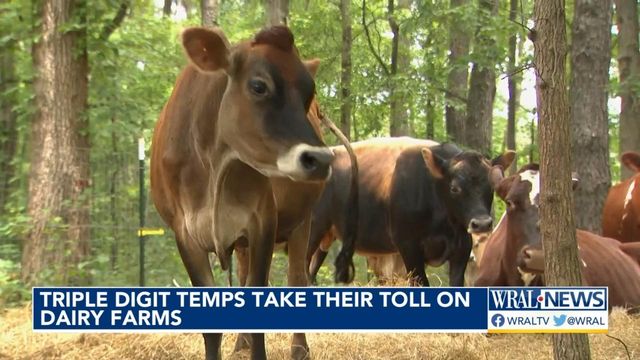Dairy farmers dealing with extreme heat try to keep the milk flowing
On Monday, we saw a tier of heat that's dangerous for people and animals. Those hot temperatures can be a big problem for dairy cows.
Posted — UpdatedHot temperatures can be a big problem for dairy cows.
Blended Family Farm’s Kate Bishop says, in a way, you’re looking at an athlete when you see a cow.
"Their dietary nutrition, it’s right up there with being a super athlete," Bishop said. "You’re asking a lot out of their bodies to be able to produce high-quality milk. And some of these girls I have, produce six, seven gallons a day."
And just like an athlete, these triple-digit temps can take a serious toll. Cows can overheat, lose calves, and their milk can dry up.
Cows are pretty resilient animals, but even heat like this gets to be a bit much for them.
Dr. Stephanie Ward is a dairy science extension specialist with NC State. She said in this heat, cows need shade, fanning when inside, and more.
According to numbers from NC State University, there are about 45,000 dairy cows scattered around North Carolina, most on small farms. Those cows generating billions of dollars for the state’s economy every year.
But high temperatures can threaten profits. That makes taking proper care when the mercury rises a major priority.
"You want to see those good, bulgy eyes," Bishop said. "You want to see she’s not panting, she’s not overheated. The skin test: you pull it, it goes right back."
Of course, the folks at NC State provide resources, research and advice through their agricultural extensions here, which are vital tools for keeping those cows cool.
• Credits
Copyright 2024 by Capitol Broadcasting Company. All rights reserved. This material may not be published, broadcast, rewritten or redistributed.





